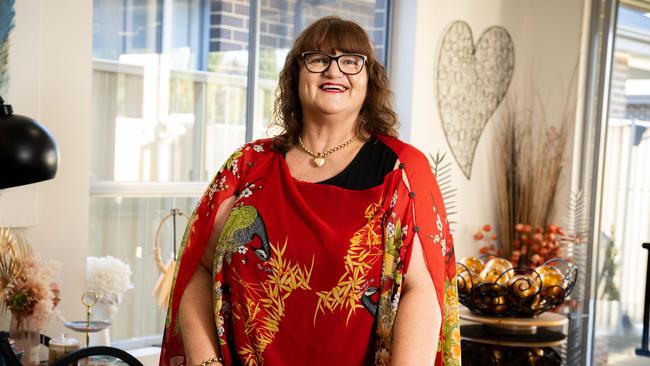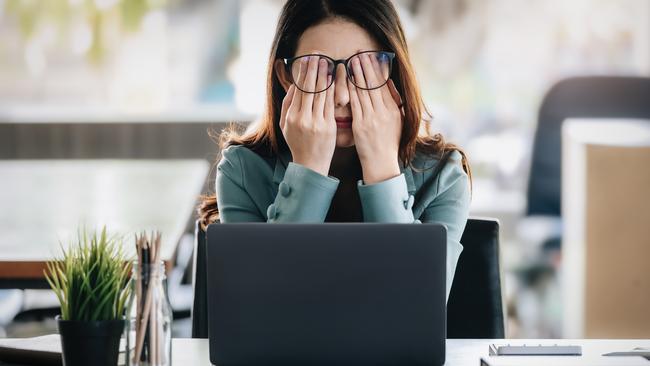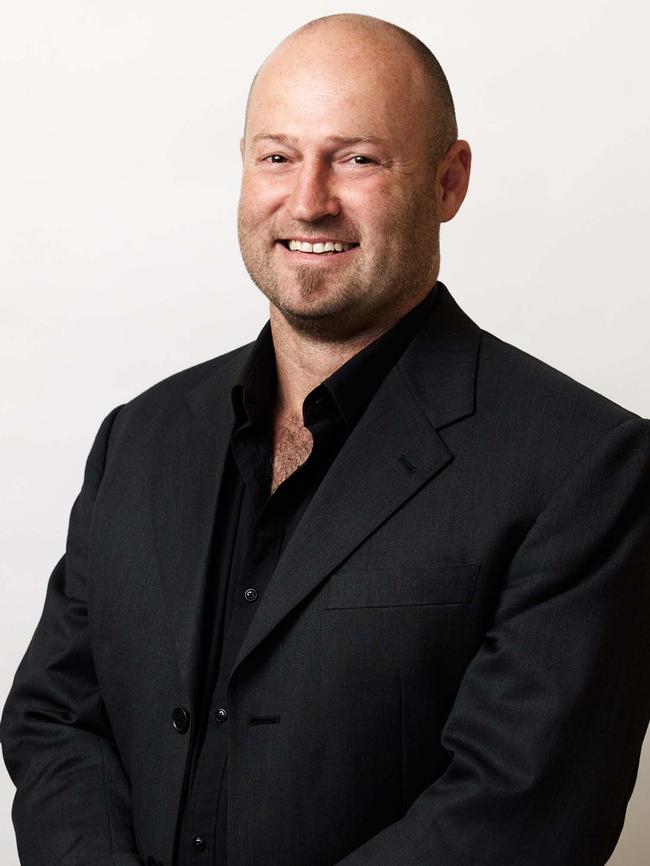Aussies suffering early 2024 burnout as the ‘great resignation’ looms
Cancer survivor Delina Herreen had to make one of the hardest decisions of her life when she quit work. Now, millions of Aussies are facing the same struggle. Here’s why.
Lifestyle
Don't miss out on the headlines from Lifestyle. Followed categories will be added to My News.
We’re one month in to 2024, and already, Aussies are feeling more drained than ever.
For many, the summer break feels like a distant memory, and fantasies of phoning it in long-term for sweet respite are a welcome distraction from work.
At its worst, even getting out of bed to start the day seems impossible.
Adelaide woman Delina Herreen, 57, knows the feeling all too well, having agonised over the decision to close her business of 17 years after a shock cancer diagnosis on top of severe burnout sapped the joy out of her life in 2022.
“Closing the business was one of the hardest decisions I had to make in my life,” Mrs Herreen, who ran a successful remedial massage company out of Grange Golf Club, told The Advertiser.
“It was a pretty chronic, severe and scary time … I just had to stop,” Mrs Herreen explained.

“I’d had some stomach issues (after having) my gallbladder removed in 2001 … I was in and out of hospital in March 2022, and it was when my stress and burnout was reaching a crescendo.
“(Then) I had an operation and they found early stages of stomach cancer.
“Alarm bells started ringing because I had been diagnosed with cervical cancer back in 1994. I thought, is this it? Am I doomed?”
Mrs Herreen underwent surgery to remove the mass, and is living cancer-free as of May 2023, but the diagnosis forced her to reassess her lifestyle.
“First comes the stress, the tiredness and the burnout. Then comes the cancer,” she warned.
“I used to work day and night and people used to say me, how do you do it? Because I loved it (but) I just got to a point where the ship was sinking and I had to jump,” the self-confessed workaholic said.
She said education into alternative medicine, and prioritising her mental health helped her back on track.
“The stomach and the brain are so connected, and I felt like stress was such a part of that for me. I started looking into it deeper and exploring holistic medicine (after the cancer diagnosis).
“You need to always see doctors, specialists, all of those, but also have some alternative, holistic tools in your toolbox,” she said, adding that “ill mental health is nothing to be ashamed of” and can often be part of the journey when battling cancer and burnout.
After adopting a “strong body, strong mind” focus via a renewed focus on exercise in 2023 — in far cry from the chaos of her working life — Mrs Herreen is now eyeing off mature age studies in AI at Adelaide Uni.
She also enjoys ballroom dancing and ukulele lessons with her husband.
“I’ve thrown myself into new hobbies and community work. I’m excited for what’s on the horizon in 2024.”

Adelaide mum Tracey, 48, who chose not to share her surname, was similarly “tortured” by her burnout phase and severe lack of sleep eight years ago.
“It was like the colour was draining from my perspective on most aspects of life, and while I was running on empty or even less I didn’t have the ability to recognise those symptoms,” the academic told The Advertiser.
With a young family in tow, putting herself first seemed out of the question, but ignoring it gradually took its toll.
“It’s as though I was treading water with a snorkel that was semi blocked.
“Decision making became very hard, I was incredibly reactive to minor things, and just a very big dose of overwhelm in situations that otherwise wouldn’t warrant that response.”
A wake up call came when her relationships began “faltering quite badly”.
It was difficult, and while still a “work-in-progress,” prioritising her mental health was key to recovery, as well as being honest with those around her about what she was going through.

If Tracey and Delina’s plights sound familiar, you could be suffering early burnout — and you’re not the only one.
As workers are encouraged to return to the office full time and ditch the flexible habits adopted from Covid while grappling with the cost-of-living crisis, recent statistics predict this may be the year the “great resignation” — a term which first gained traction in 2021 — comes to full fruition in Australia.
While Australia didn’t see large volumes of resignations akin to the US in 2021 and 2022, according to research conducted by Allianz Australia in September 2023, more than 1.4 million Australians are “very likely” to quit their jobs this year.
The insurance provider cited mounting mental health pressure as the reason.
PwC’s 2023 Hopes and Fears Global Workforce Survey also found 26 per cent of employees were likely to change jobs in 2024, up from 19 per cent the previous year.
So why are we burning out faster than ever?

Adelaide psychologist and member of the Australian Association of Psychologists, Jamie Witt, said early-in-the-year burnout can be a “follow on” to how a worker felt before Christmas, when they were hopeful a break would rejuvenate them.
“They are now feeling overwhelmed about the work coming up as they don’t feel like they have had enough of a break,” Mr Witt told The Advertiser.
He added that lifestyle pressures during the summer break, from overindulging to extended time with family, could pile up and make your start of the year more stressful than the end, when many feel the pressure of December deadlines.
“Lifestyle pressures that become revealed to a person during time off such as a relationship or child issues, tasks around the house that were done and rest didn’t occur as planned, or even being around people that caused stress rather than enjoyment can lead to early burnout,” he said.
“Some people see the year ahead without excitement as they are no longer enjoying their role or it was causing stress and anxiety before the break.
“Time off is often a time of reflection, and sometimes people realise what they do isn’t contributing the way they thought they would.”

He added that people feel more “trapped” in their jobs due to the cost-of-living crisis, which can lead to “nihilist thought processes, depressive symptoms and reflective anxiety about life,” impacting overall wellbeing and health.
He suggested setting boundaries to prioritise your mental health, such as taking a Friday off every two to three months with your annual leave entitlements.
But sometimes, there are simply “no alternatives” to leaving a role, and a career or job change can be the best option to improve your wellbeing.
Wellness coach Amelia Phillips, who works for nationwide executive coaching company Peoplemax, said “a quick holiday fix is unlikely to completely undo the long-term physical and cognitive impacts burnout has on the body”.
“A new year can also come with high expectations, which in itself can be stressful if you think you’re not measuring up. We can quickly find ourselves drowning in our to-do lists again.”
She said until companies started prioritising wellness by engaging “wellness warriors,” and setting up a framework of practices and policies, they faced the threat of needlessly losing valuable talent.
“Working from home has helped many employees strike a much better work-life balance, and remains an important part of the equation for workplaces in 2024. But there are other ways workplaces can and should protect their staff from burnout.
“Walking meetings, standing desks and regular afternoon stretches are simple ways workplaces can encourage more movement and less sitting, which has long been associated with poor physical and mental health outcomes.”
She said burnout could be an indication your current working patterns are not viable.
“No one deserves to feel like they are drowning at work, and frankly no one wants a work colleague who is on the edge of burnout.
“Talk to the right people at work, communicate your challenges and let them help you too. If they are resistant to this, that’s when I’d be questioning the values of the organisation and if they align with yours.”
Renewed focus on prioritising health and wellbeing comes amid News Corp’s Health of The Nation report, which found that Australians have become a nation of people at risk of a life limited by preventable diseases and poor health choices.
Alarmingly, the snapshot found that South Australia has the highest rates of obesity at 38 per cent.
More Coverage
Originally published as Aussies suffering early 2024 burnout as the ‘great resignation’ looms




